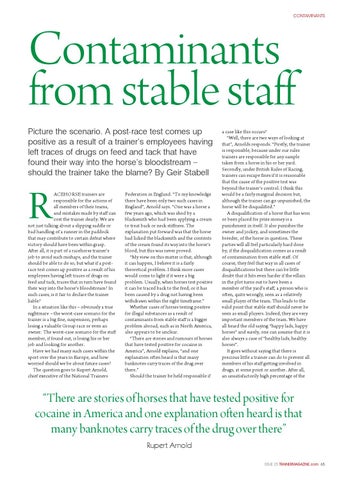CONTAMINANTS.qxd:Jerkins feature.qxd
25/2/09
00:12
Page 2
CONTAMINANTS
Contaminants from stable staff Picture the scenario. A post-race test comes up positive as a result of a trainer’s employees having left traces of drugs on feed and tack that have found their way into the horse’s bloodstream – should the trainer take the blame? By Geir Stabell
R
ACEHORSE trainers are responsible for the actions of all members of their teams, and mistakes made by staff can cost the trainer dearly. We are not just talking about a slipping saddle or bad handling of a runner in the paddock that may contribute to certain defeat where victory should have been within grasp. After all, it is part of a racehorse trainer’s job to avoid such mishaps, and the trainer should be able to do so, but what if a postrace test comes up positive as a result of his employees having left traces of drugs on feed and tack, traces that in turn have found their way into the horse’s bloodstream? In such cases, is it fair to declare the trainer liable? In a situation like this – obviously a true nightmare – the worst-case scenario for the trainer is a big fine, suspension, perhaps losing a valuable Group race or even an owner. The worst-case scenario for the staff member, if found out, is losing his or her job and looking for another. Have we had many such cases within the sport over the years in Europe, and how worried should we be about future cases? The question goes to Rupert Arnold, chief executive of the National Trainers
Federation in England. “To my knowledge there have been only two such cases in England”, Arnold says. “One was a horse a few years ago, which was shod by a blacksmith who had been applying a cream to treat back or neck stiffness. The explanation put forward was that the horse had licked the blacksmith and the contents of the cream found its way into the horse’s blood, but this was never proved. “My view on this matter is that, although it can happen, I believe it is a fairly theoretical problem. I think more cases would come to light if it were a big problem. Usually, when horses test positive it can be traced back to the feed, or it has been caused by a drug not having been withdrawn within the right timeframe.” Whether cases of horses testing positive for illegal substances as a result of contaminants from stable staff is a bigger problem abroad, such as in North America, also appears to be unclear. “There are stories and rumours of horses that have tested positive for cocaine in America”, Arnold explains, “and one explanation often heard is that many banknotes carry traces of the drug over there.” Should the trainer be held responsible if
a case like this occurs? “Well, there are two ways of looking at that”, Arnolds responds. “Firstly, the trainer is responsible, because under our rules trainers are responsible for any sample taken from a horse in his or her yard. Secondly, under British Rules of Racing, trainers can escape fines if it is reasonable that the cause of the positive test was beyond the trainer’s control. I think this would be a fairly marginal decision but, although the trainer can go unpunished, the horse will be disqualified.” A disqualification of a horse that has won or been placed for prize money is a punishment in itself. It also punishes the owner and jockey, and sometimes the breeder, of the horse in question. These parties will all feel particularly hard done by, if the disqualification comes as a result of contamination from stable staff. Of course, they feel that way in all cases of disqualifications but there can be little doubt that it hits even harder if the villain in the plot turns out to have been a member of the yard’s staff, a person who is often, quite wrongly, seen as a relatively small player of the team. This leads to the valid point that stable staff should never be seen as small players. Indeed, they are very important members of the team. We have all heard the old saying “happy lads, happy horses” and surely, one can assume that it is also always a case of “healthy lads, healthy horses”. It goes without saying that there is precious little a trainer can do to prevent all members of his staff getting involved in drugs, at some point or another. After all, an unsatisfactorily high percentage of the
“There are stories of horses that have tested positive for cocaine in America and one explanation often heard is that many banknotes carry traces of the drug over there” Rupert Arnold ISSUE 25 TRAINERMAGAZINE.com 65
